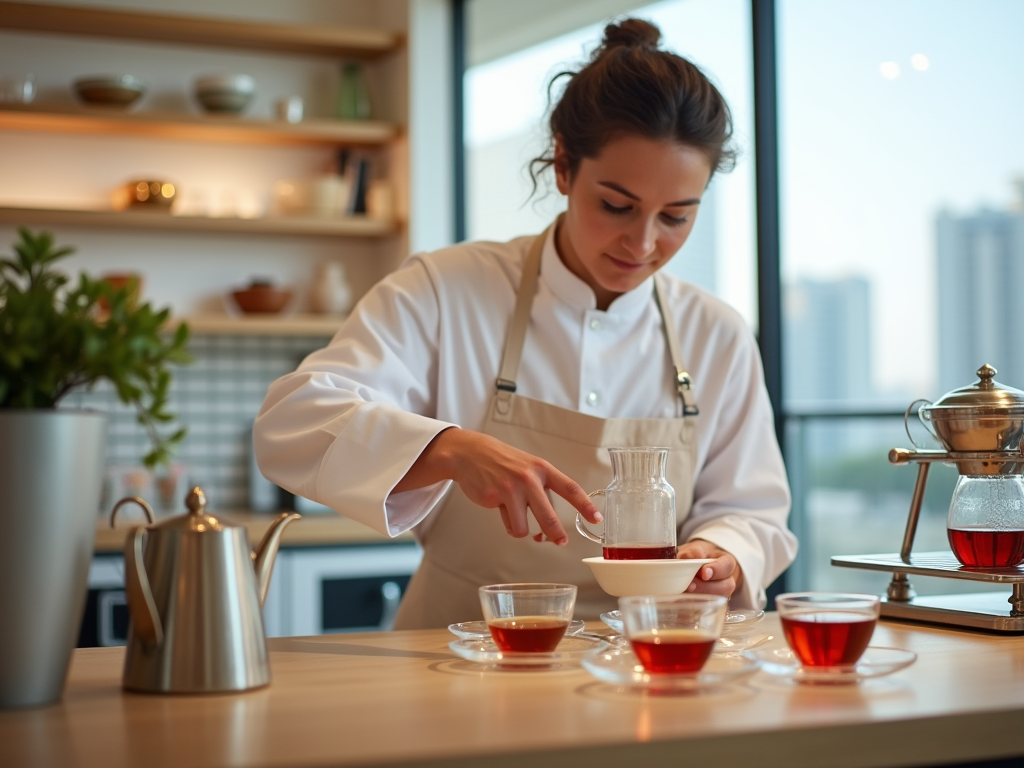Opening a specialty tea shop in Dubai presents a unique blend of opportunities and challenges. With the city’s diverse culture and growing appreciation for premium teas, starting your own tea shop can be both rewarding and profitable. In this guide, we’ll explore the essential steps to establish your tea business in this vibrant market, covering everything from market research to sourcing products and effective marketing strategies.
1. Conduct Market Research

Before diving headfirst into opening your specialty tea shop, conducting thorough market research is crucial. This first step will reveal the competitive landscape, consumer preferences, and potential gaps in the market. To accomplish this:
- Identify your target audience by demographics, preferences, and purchasing behavior.
- Analyze competitors in the area to understand their offerings, pricing strategies, and customer engagement.
- Gather feedback through surveys or focus groups to ascertain what potential customers want in a specialty tea shop.
Once you have compiled this data, you can tailor your business model, ensuring that it meets the needs and desires of your target market. Market research is an ongoing process; stay updated on trends in the tea industry to continuously refine your offerings.
2. Business Registration and Licensing

Setting up a business in Dubai involves navigating various legal requirements. As a foreign entrepreneur, you’ll need to secure the appropriate licenses to operate within the emirate. Here’s how you can go about it:
- Select a business structure (e.g., LLC, sole proprietorship) that fits your goals.
- Register your company name with the Department of Economic Development (DED).
- Apply for a trading license specifically for selling food and beverages, which includes specialty teas.
- Understand any other permits needed, such as health and safety inspections.
Working with a business consultant familiar with Dubai’s regulations can streamline this process, minimizing delays and complications as you get your shop up and running.
3. Choosing the Right Location
The success of your specialty tea shop largely hinges on its location. In Dubai, foot traffic, visibility, and accessibility are pivotal factors. Here are some tips for selecting an ideal location:
- Consider areas with high tourist traffic, such as malls, tourist destinations, or popular dining districts.
- Evaluate local demographics to ensure they align with your target market.
- Research rental costs and the potential return on investment for each area.
- Inspect the space for necessary amenities, such as kitchen facilities for any food pairings.
Ultimately, the goal is to find a location that offers a balance between affordability and market reach, driving both foot traffic and sales.
As a specialty tea shop, the quality of your tea offerings can set you apart from competitors. Establishing relationships with reputable suppliers is essential. Follow these steps to source quality products:
- Research tea farms and distributors that specialize in high-quality leaves, focusing on organic and specialty varieties.
- Attend industry trade shows to meet suppliers and discover new brands and products.
- Negotiate terms to ensure fair pricing and reliable delivery schedules.
- Consider offering unique blends or exclusive flavors to distinguish your shop.
By prioritizing quality, you’ll cultivate a loyal customer base that appreciates the nuances of specialty teas.
5. Developing a Marketing Strategy
Once your tea shop is up and running, a robust marketing strategy will be critical for attracting and retaining customers. Here are some effective methods to consider:
- Utilize social media platforms to showcase your tea varieties, share brewing tips, and engage with your audience.
- Organize tasting events or workshops to introduce new customers to your offerings.
- Collaborate with local businesses or influencers to enhance your visibility.
- Create a loyalty program to encourage repeat visits, offering discounts for frequent customers.
Monitoring and analyzing the results of your marketing efforts will help you adapt your strategy to better meet consumer needs and optimize your brand presence.
Conclusion
Opening a specialty tea shop in Dubai can be an enriching endeavor, filled with cultural exchanges and community engagement. By thoroughly researching the market, following the necessary legal procedures, selecting a prime location, sourcing quality teas, and implementing an effective marketing strategy, you’re setting the foundation for a successful tea business. The key lies in continuous learning and adaptability, shaping your business to meet the evolving demands of Dubai’s tea enthusiasts.
Frequently Asked Questions
1. What are the initial costs of starting a specialty tea shop in Dubai?
The initial costs can vary widely depending on location, size, and product offerings but typically include rent, licensing, inventory, furniture, and marketing. A rough estimate could range from AED 100,000 to AED 500,000.
2. Do I need a special license to sell tea in Dubai?
Yes, you need to obtain a food and beverage trading license from the Department of Economic Development (DED) to legally sell tea and refreshments in Dubai.
3. How can I stand out from other tea shops in Dubai?
Differentiate your shop by offering unique blends, personalized customer service, and events like tea tastings or workshops that engage and educate your customers.
4. Is it necessary to have prior experience in the tea industry?
While prior experience can be beneficial, it is not mandatory. A passion for tea, combined with thorough research and willingness to learn, can compensate for a lack of industry experience.
5. What is the best time to open a specialty tea shop in Dubai?
Consider opening during cooler months (October to March) when more people are inclined to enjoy hot beverages. Additionally, timing your launch with festive occasions can attract initial foot traffic.

